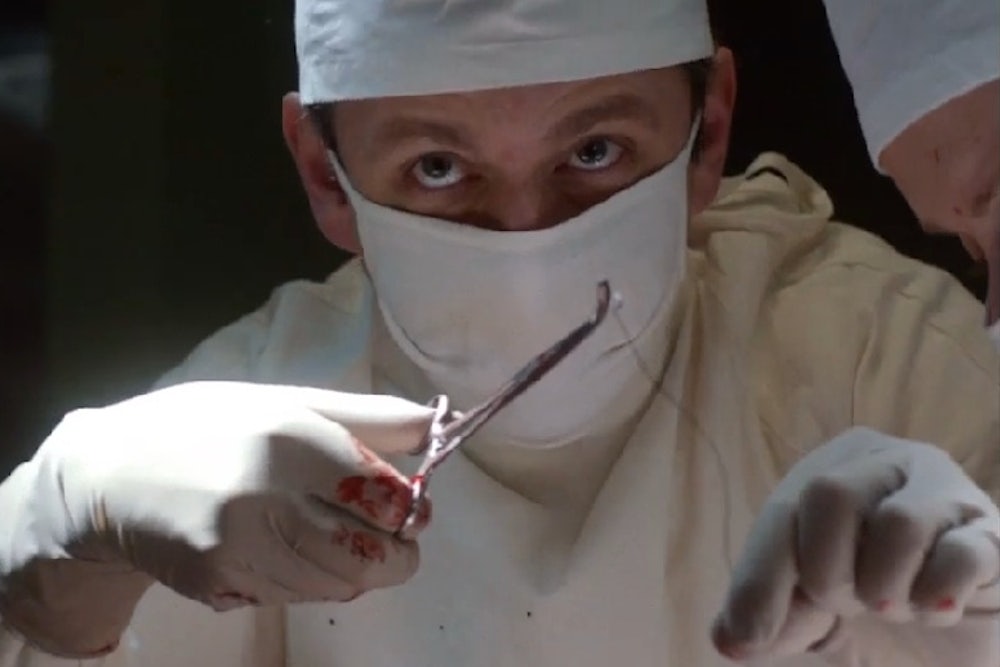There’s a scene toward the end of the first episode of Showtime’s new drama “Masters of Sex” in which two test subjects embrace on a bed in a hospital laboratory. Bill Masters and Virginia Johnson, the real-life sex researchers from St. Louis’s Washington University who performed trailblazing studies on human subjects in the years before the sexual revolution, watch silently through a pane of glass. A scroll of paper charting the subjects’ heart rates unspools onto the floor nearby. The sound of heavy breathing fills the room. Less than an hour and many sex scenes into the series, it’s not hard to identify with the researchers behind the glass: partly piqued, partly numb. And this tension is what makes this show the best new fall drama on TV.
“Masters of Sex,” which premiered last night, tells the story of Masters and Johnson: the former a star fertility specialist with a god complex, the latter his secretary-turned-partner, a one-time nightclub singer and single mother whose warmth and sensitivity balance out Masters’s icy competence. Johnson is confident and sexually open—her prowess in the bedroom is a source of much discussion. (“This one’s different, she knows herself,” one man who has slept with her says admiringly.) Masters is a more complex case. “Science holds the key,” he says in the pilot. “Yet we sit huddled in the dark like prudish cavemen filled with shame.” So begins his brilliant, obsessive crusade for enlightenment. When we first meet him, it is 1956, and he is peering through a peephole in a brothel, notepad in hand. Over the course of the series, we discover a knot of his own repressed desires beneath all the clinical detachment.
Most prestige drama, needless to say, relies heavily on sex. But in today’s antihero-obsessed TV landscape, sex is often an alternate form of violence or a supplement to it. Take the scene in “Breaking Bad” when Walt aggressively undresses his wife in the kitchen, leaving a smudge of her green face mask on the refrigerator—foreshadowing the monstrous transformation to come. Sex on “The Sopranos” was also about power, from Tony bending his secretary over a desk to Richie, mid-doggy-style, pointing a gun at Janice’s head. On “Game of Thrones,” the sex is just as theatrical and brutal as the bloodshed.
Sex is everywhere on “Masters,” a constant atmospheric hum, from a hotdog sizzling on the grill to a sensually eaten pickle. But—in contrast to what we’ve come to expect from cable drama—the action mostly happens in the spaces between the sex scenes, rather than during them. Virginia and a young doctor named Ethan Haas (Nicholas D’Agosto) sleep together early in the first episode, before we have had time to emotionally invest in either character; the next few episodes are spent exploring and unraveling the consequences—Virginia refuses to commit, Ethan seethes with unrequited lust.
It’s a mark of the boldness of this show that the sex is sometimes explicitly unsexy: when it involves the STD-infected prostitutes Masters recruits for testing, for instance, or in the case of Masters’s own workmanlike attempts to impregnate his wife (Caitlin Fitzgerald). “We could look each other in the eyes sometimes,” she says. “Until you’re pregnant,” he replies, facing her back, “this is the most effective position.” That’s not to say that “Masters of Sex” strips sex of its frisson. The bodies on display are still unrealistically lithe. But sex gains a new kind of intrigue, less based on shock value or titillation (though there’s that, too) than the eerie thrill of seeing something familiar made newly strange. It’s an effect of all the wires and monitors, the post-coital interrogations from Masters and Johnson pepped with phrases like “auto-manipulation” and “turgidity of nipples,” the translucent dildo called “Ulysses” that looks like some futuristic torture device from an alien abduction movie. Sex is not just for pleasure. It can also be scary, and tedious, and dull.
And amid all the medical lingo and machinery there are constant reminders that sex is too messy to be scientized. One participant in the couples study develops a crush on the woman he is matched with. “Do I look like a lab monkey to you?” he asks the researchers, distraught. “Why can’t two people just have a good time and leave it at that?” one young woman asks, rhetorically. The chemistry between Masters and Johnson intensifies as their observation sessions grow more and more routine. Watching other people is at once a kind of foreplay and a kind of release for them, and the voyeurism feels somehow creepier for its utilitarianism. “He’s not watching you, he’s watching science,” Johnson tells one participant in the study. “Science” becomes the show’s prevailing euphemism. “I really missed being a pioneer on the front lines of science,” one female test subject says, after the couples study ends.
In this way, “Masters of Sex” captures the atmosphere of its era better than all of “Mad Men”’s exquisite costumes and scrupulous sets: the sense of being on the brink of a seismic shift in the zeitgeist, as well as the particular courage required to be a sexually liberated woman in the baffling, buttoned-up years after Alfred Kinsey’s ground-breaking studies but before the sexual revolution. And the show does so without condescension, but rather with a winking understanding that times have changed less than we think. “The truth is nobody understands sex,” Masters says wearily. Given that a show set in the '50s feels like the freshest take on sexual relations in awhile, it's easy to agree.
Laura Bennett is a staff writer at The New Republic. Follow her @lbennett.
